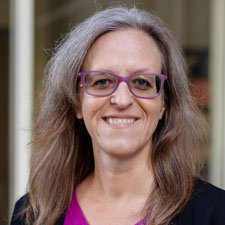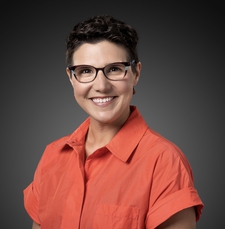Professor Rossella Santagata
Professor and Director Rossella Santagata, Center for Research on Teacher Development and Professional Practice, School of Education, University of California, Irvine
Centering Teacher Voices and Research-Practice Partnerships to Support Teaching Improvement
Abstract
Many improvement efforts in education rely on teachers enacting innovations in their classrooms. The systemic nature of educational institutions, however, often makes classroom innovations hard to implement because of conflicting norms and practices, few settings for adult learning, and cultural ways of doing schooling that tend to reproduce the status quo, rather than supporting experimentation and equitable outcomes. Yet, there are teachers every day and everywhere in the world who learn to teach in new ways and transform students’ lives despite endless challenges. In this talk, I will illustrate and discuss the affordances of teacher inquiry into their teaching and of research-teacher collaborations, particularly around artifact of practice, such as video and student work. I will draw on two decades of research on teacher noticing and learning from video as well as on my own longitudinal research and current research-practice partnership efforts to propose directions for future scholarship in this field.
About the keynote speaker
 Dr. Rossella Santagata is a Professor of Education and Director of the Center for Research on Teacher Development and Professional Practice in the School of Education at the University of California, Irvine. Inspired by international, cross-cultural research on mathematics and science classroom teaching, Dr. Santagata has dedicated her scholarly career to the study of analysis and inquiry into teaching as a lever for elevating teacher professional knowledge, supporting their career-long learning, and engaging in productive research-practice collaborations. Her research funded by the Institute of Education Sciences, the National Science Foundation, the Spencer Foundation, and most recently, the WT Grant Foundation, has led to numerous publications centered on the use of video as a tool for teacher professional growth, on structured analysis of practice for teachers to learn to learn from their teaching, and on teacher noticing as an essential component of teacher professional practice. The most rewarding aspect of her job continues to be the close collaboration with educators who dedicate their lives to the improvement of the learning opportunities of students from marginalized communities.
Dr. Rossella Santagata is a Professor of Education and Director of the Center for Research on Teacher Development and Professional Practice in the School of Education at the University of California, Irvine. Inspired by international, cross-cultural research on mathematics and science classroom teaching, Dr. Santagata has dedicated her scholarly career to the study of analysis and inquiry into teaching as a lever for elevating teacher professional knowledge, supporting their career-long learning, and engaging in productive research-practice collaborations. Her research funded by the Institute of Education Sciences, the National Science Foundation, the Spencer Foundation, and most recently, the WT Grant Foundation, has led to numerous publications centered on the use of video as a tool for teacher professional growth, on structured analysis of practice for teachers to learn to learn from their teaching, and on teacher noticing as an essential component of teacher professional practice. The most rewarding aspect of her job continues to be the close collaboration with educators who dedicate their lives to the improvement of the learning opportunities of students from marginalized communities.
Professor Robert Coe
Professor Robert Coe, Director of Research and Development, Evidence Based Education
Measuring Teaching Quality for the Purpose of Improving it
Abstract
The challenges of defining and measuring teaching quality are many and well established. Over the last three years, a team at Evidence Based Education have been building a suite of tools, guided by the principles of practical measurement, that are designed to hold up a mirror to classroom teachers to help them see their classroom practice more clearly and objectively, and hence support them in choosing, enacting and sustaining changes that make their teaching more effective. This 'Great Teaching Toolkit' also supports teachers in developing their understanding of student learning and pedagogy, and school leaders in understanding and evaluating the school-wide factors that support classrooms. Among the tools we are developing are student surveys, classroom observation protocols, assessments of teacher knowledge, teachers' self-evaluation, classroom-level value-added analyses, and staff surveys. All these are fed back confidentially, only to the person they concern.
In this talk I will outline the underpinning theory of action and design of the Great Teaching Toolkit, what we have built so far, and some preliminary validation analysis.
About the keynote speaker
 Professor Robert Coe is Director of Research and Development at Evidence Based Education. Coe is particularly interested in the uses of research by teachers and school leaders and how it can be integrated into everyday pedagogy and school-level decision-making. He was a co-author of the Education Endowment Foundation's Teaching and Learning Toolkit, the Sutton Trust report ‘What makes great teaching?’ and the ‘Developing Great Teaching’ report for the Teacher Development Trust. He has been a member of numerous advisory groups on assessment, evaluation and use of evidence.
Professor Robert Coe is Director of Research and Development at Evidence Based Education. Coe is particularly interested in the uses of research by teachers and school leaders and how it can be integrated into everyday pedagogy and school-level decision-making. He was a co-author of the Education Endowment Foundation's Teaching and Learning Toolkit, the Sutton Trust report ‘What makes great teaching?’ and the ‘Developing Great Teaching’ report for the Teacher Development Trust. He has been a member of numerous advisory groups on assessment, evaluation and use of evidence.
Associate Professor Sarah Schneider Kavanagh
Dr. Sarah Schneider Kavanagh is an Associate Professor of Teacher Education at the University of Pennsylvania's Graduate School of Education.
Breaking the Fourth Wall of Professional Learning: Research on Practice-Based Designs for Professional Learning
Abstract
Since the turn of the 21st century, research on teacher education has seen an explosion of research referencing the phrase “practice based teacher education." While the phrase has now become commonplace, the field lacks a shared definition of it. In fact, researchers hold competing and contradictory ideas about what it means to base teacher learning in practice. This talk explores how small differences in what we mean when we say "practice based teacher education" may hold big consequences for the field. By examining the definitional edges of "practice based teacher education," the talk will explore what the opportunities, tensions, and dangers are for the growing field of study.
About the keynote speaker
 Dr. Sarah Schneider Kavanagh is an Associate Professor of Teacher Education at the University of Pennsylvania's Graduate School of Education. Her work investigates the pedagogical approaches that teacher educators use to ground teacher learning opportunities in the practice of teaching. She is centrally concerned with examining how designs for teacher learning balance attention to teaching as a professional practice and teaching as mission-driven work focused on social transformation. As the former director Teacher Education by Design at the University of Washington and the incoming director of the Collaboratory for Teacher Education at the University of Pennsylvania, she works to build professional communities of teacher educators that center on collaborative approaches to learning in, through, and for practice. Her published work can be found in the American Educational Research Journal, Educational Researcher, Cognition and Instruction, Teaching and Teacher Education, The Journal of Teacher Education, as well as other leading educational research journals.
Dr. Sarah Schneider Kavanagh is an Associate Professor of Teacher Education at the University of Pennsylvania's Graduate School of Education. Her work investigates the pedagogical approaches that teacher educators use to ground teacher learning opportunities in the practice of teaching. She is centrally concerned with examining how designs for teacher learning balance attention to teaching as a professional practice and teaching as mission-driven work focused on social transformation. As the former director Teacher Education by Design at the University of Washington and the incoming director of the Collaboratory for Teacher Education at the University of Pennsylvania, she works to build professional communities of teacher educators that center on collaborative approaches to learning in, through, and for practice. Her published work can be found in the American Educational Research Journal, Educational Researcher, Cognition and Instruction, Teaching and Teacher Education, The Journal of Teacher Education, as well as other leading educational research journals.